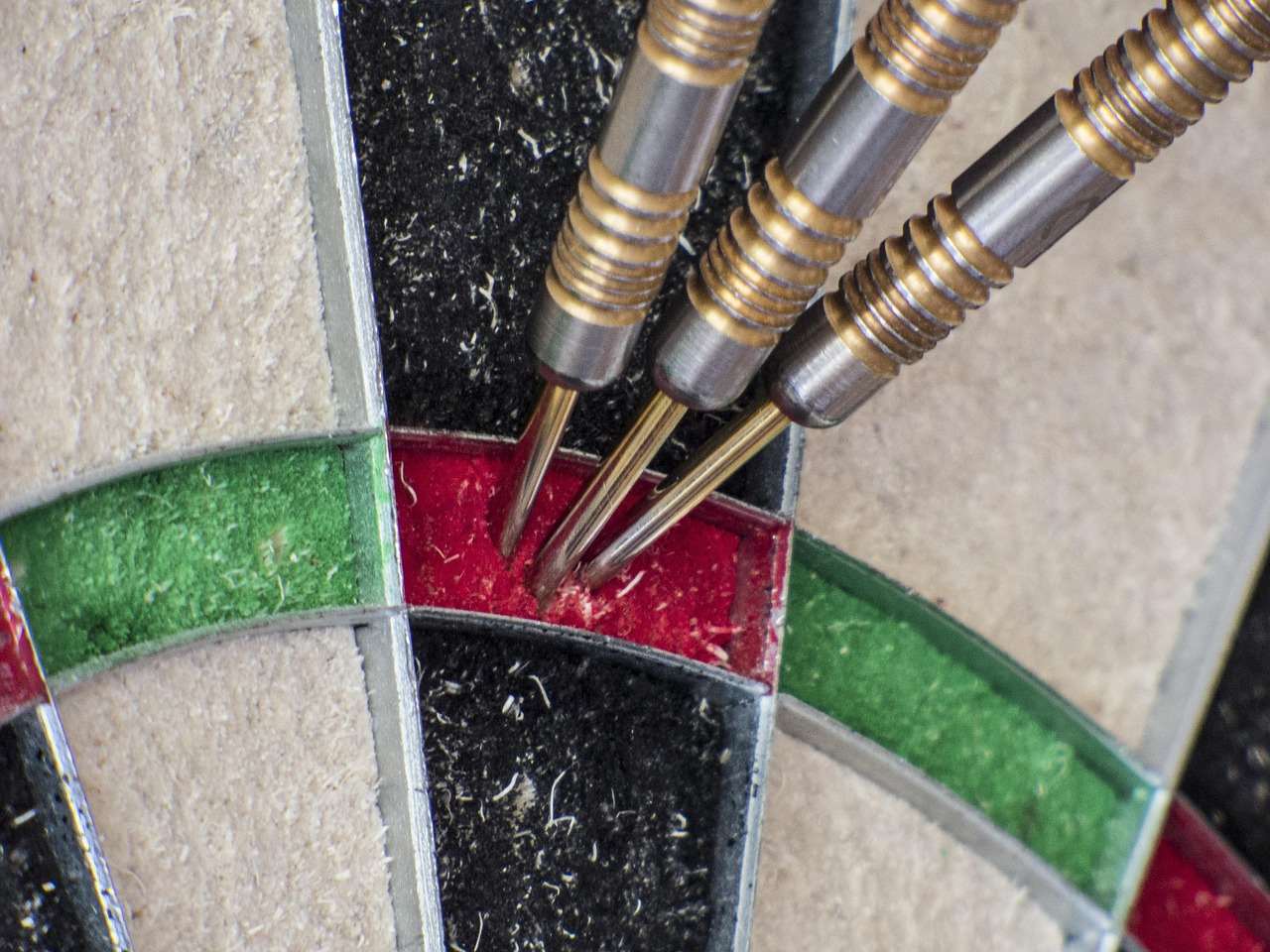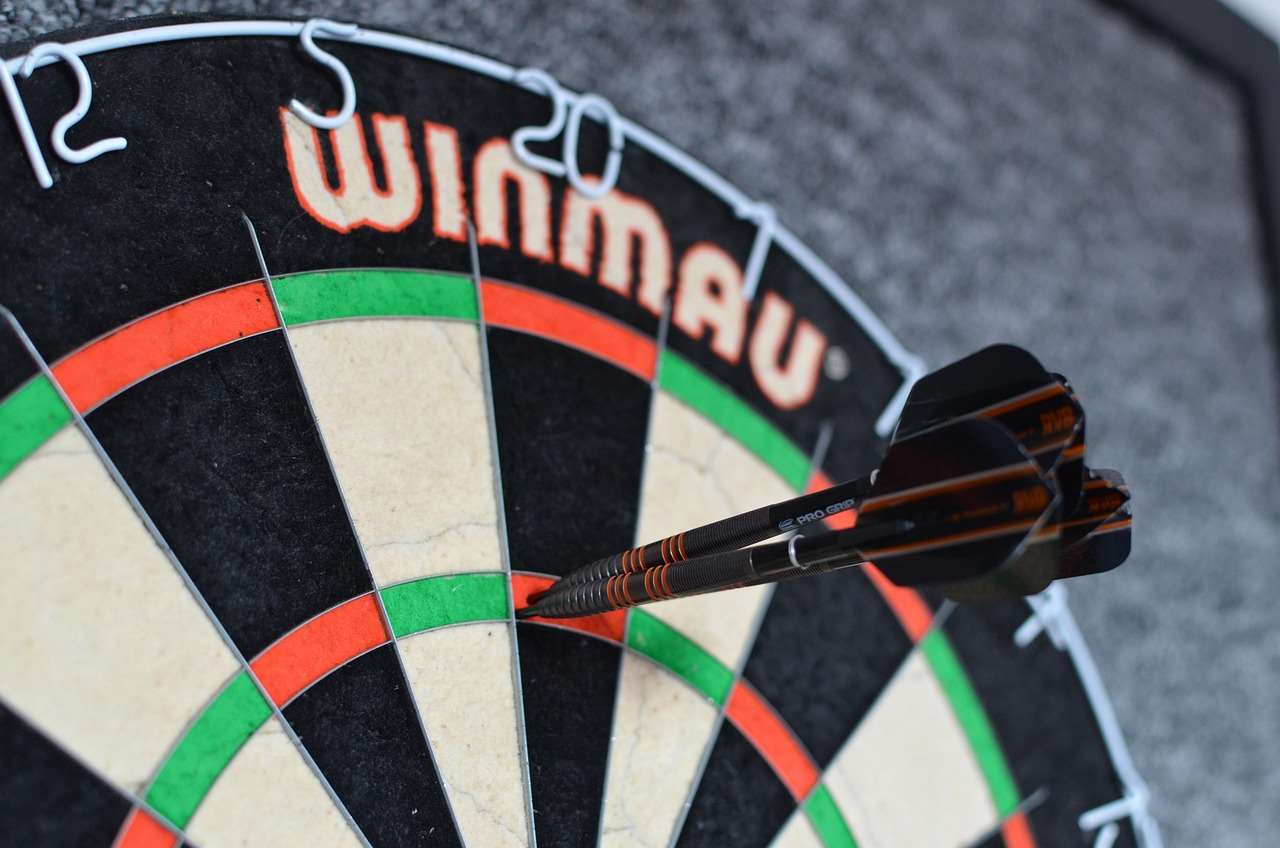In the colourful world of darts, ‘Fish and Chips’ isn’t just a tasty meal; it’s the **darts lingo** for scoring a 26. This article will explore the origins of this quirky term, delve into other common **darts slang**, and help you understand the rich vocabulary that makes the game so much fun to play and watch.
⚠️ Still Using Pen & Paper (or a Chalkboard)?! ⚠️
Step into the future! The Dart Counter App handles all the scoring, suggests checkouts, and tracks your stats automatically. It's easier than you think!
Try the Smart Dart Counter App FREE!Ready for an upgrade? Click above!
Why is 26 Called ‘Fish and Chips’ in Darts Lingo?
The reason behind calling 26 ‘Fish and Chips’ is wonderfully simple: it’s Cockney rhyming slang. In Cockney rhyming slang, a phrase is used to rhyme with a word, and then only the rhyming phrase is used. In this case, ‘Fish and Chips’ rhymes with ‘six’, and six is added to twenty to make twenty-six.
It’s a classic example of how language evolves within specific communities, and **darts lingo**, like many other forms of slang, adds a layer of cultural richness to the sport. Understanding these terms not only makes you sound like a seasoned pro, but also helps you appreciate the history and traditions of darts. To get up to speed on the basics, consider exploring Basic Darts Fundamentals for Beginners.

A Deep Dive into Darts Slang Beyond ‘Fish and Chips’
While ‘Fish and Chips’ is a popular and well-known term, the world of **darts slang** extends far beyond this culinary connection. Here are some other common phrases you might hear around the oche:
- Ton: A score of 100.
- Ton 40: A score of 140.
- Shanghai: Hitting a single, double, and treble of the same number.
- Bed and Breakfast: Scoring 26 (20, 5, and 1), supposedly costing £2.60 for a bed and breakfast in the past.
- Bullseye: The center of the board, worth 50 points.
- Double Top: The double 20, worth 40 points.
Understanding these terms can significantly enhance your experience, whether you’re playing or watching. It’s like learning a secret language that unlocks a deeper appreciation for the game. Learning this language will make Adapting darts rules for beginners easier to comprehend.
Other regional variations in darts terminology
It’s also worth noting that **darts lingo** can vary regionally. What’s common in one part of the UK might be unheard of in another, or even in other countries where darts is popular. Be prepared to encounter different terms and phrases as you explore the global darts community.
The Significance of Knowing Darts Lingo: ‘Fish and Chips’ and Beyond
Knowing **darts lingo: ‘Fish and Chips’ (alternate term for 26)** and other slang terms offers several advantages:
- Better communication: You can easily communicate with other players and understand commentary during matches.
- Deeper understanding: You gain a deeper understanding of the game’s culture and history.
- Enhanced enjoyment: The game becomes more enjoyable as you become more immersed in its unique language.
- Improved gameplay: While knowing the slang won’t magically improve your throw, it can contribute to a more confident and engaged mindset.
Think of it as adding another layer to your overall darts skillset. Just as you practice your throwing technique, familiarizing yourself with the language of darts is a valuable investment.

How to Learn and Use Darts Lingo Effectively
Learning **darts lingo** doesn’t have to be a chore. Here are some practical tips to help you pick up the lingo and use it effectively:
- Watch darts matches: Pay attention to the commentary and listen for common phrases.
- Play with experienced players: Engage in conversations and ask them to explain any terms you don’t understand.
- Read darts articles and forums: Immerse yourself in the online darts community.
- Don’t be afraid to ask: If you hear a term you don’t know, simply ask what it means. Most darts players are happy to share their knowledge.
- Use the terms yourself: The best way to learn is by doing. Start incorporating the **darts slang** into your own conversations and gameplay.
Remember, it’s all about gradual immersion and active participation. The more you expose yourself to the language of darts, the more naturally it will come to you.
The Psychology Behind Darts Slang
Beyond the practical benefits, understanding **darts lingo: ‘Fish and Chips’ (alternate term for 26)** and other terms touches on the psychology of the game. Using specific **darts terminology** fosters a sense of camaraderie and belonging. When you use the same language as other players, you feel more connected to the community.
This sense of connection can be particularly important in a sport that is often played in social settings. Darts is as much about the social interaction as it is about the competition. Being able to share a laugh over a well-placed ‘Fish and Chips’ or a ‘Ton 40’ adds to the overall experience.

Darts Slang and the Culture of Darts
The use of **darts lingo** is deeply intertwined with the culture of the sport. It reflects the history, traditions, and social aspects of darts. It’s a living language that continues to evolve and adapt over time.
From its roots in British pubs to its global popularity today, darts has always been a game of the people. The language of darts reflects this, with its informal, often humorous, and always engaging nature. It is possible to change up the game itself, such as with Creative dart rules for parties and social gatherings.
Common Mistakes to Avoid When Using Darts Lingo
While learning **darts slang** is a great way to enhance your experience, it’s important to use it correctly. Here are some common mistakes to avoid:
- Using terms out of context: Make sure you understand the meaning of a term before using it.
- Forcing the slang: Don’t try to use slang just for the sake of it. It should come naturally in conversation.
- Using offensive language: Be mindful of your audience and avoid using any terms that could be considered offensive.
- Mispronouncing terms: Pay attention to how experienced players pronounce the slang.
Ultimately, the goal is to use **darts terminology** in a way that enhances the experience for everyone involved. Knowing when and how to use the terms appropriately is key.

Keeping Up with the Ever-Evolving Darts Lingo
Like any language, **darts lingo** is constantly evolving. New terms and phrases emerge, while others fade into obscurity. To stay up-to-date, it’s important to remain active in the darts community.
- Follow darts news and events: Stay informed about the latest developments in the sport.
- Engage in online forums and social media groups: Connect with other darts enthusiasts and share your knowledge.
- Attend local darts tournaments: Experience the game firsthand and listen to the conversations around you.
By staying engaged, you can ensure that your **darts terminology** remains current and relevant.
From ‘Fish and Chips’ to Bullseye: Mastering the Art of Darts
Understanding **darts lingo: ‘Fish and Chips’ (alternate term for 26)** isn’t just about memorizing a list of words and phrases; it’s about embracing the culture and traditions of the game. By immersing yourself in the language of darts, you can deepen your appreciation for the sport and enhance your overall experience.
So, the next time you hear someone shout “Fish and Chips!” at the oche, you’ll know exactly what they mean. And who knows, you might even start using the term yourself!

Conclusion: Embrace the Lingo and Elevate Your Darts Experience
Mastering **darts lingo**, from understanding why ‘Fish and Chips’ represents 26 to appreciating the nuances of other terms, is a key element in fully embracing the sport. It enhances communication, deepens understanding, and adds a layer of enjoyment to every game. So, dive into the world of **darts terminology**, use it with confidence, and watch as your appreciation for this timeless game grows. Ready to take your game to the next level? Consider joining a local darts club or participating in a friendly tournament. Start practicing those phrases, and you’ll be talking the talk in no time!
Hi, I’m Dieter, and I created Dartcounter (Dartcounterapp.com). My motivation wasn’t being a darts expert – quite the opposite! When I first started playing, I loved the game but found keeping accurate scores and tracking stats difficult and distracting.
I figured I couldn’t be the only one struggling with this. So, I decided to build a solution: an easy-to-use application that everyone, no matter their experience level, could use to manage scoring effortlessly.
My goal for Dartcounter was simple: let the app handle the numbers – the scoring, the averages, the stats, even checkout suggestions – so players could focus purely on their throw and enjoying the game. It began as a way to solve my own beginner’s problem, and I’m thrilled it has grown into a helpful tool for the wider darts community.